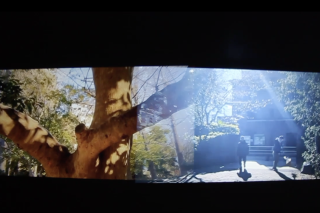Grace Hopper College
Class of 2026
American Studies
Imagined Encounter
Imagined Encounter
By Miye Sugino
The future as it emerges reimagines the way we know history. Miye Sugino reconsiders the histories of her two grandmothers, which have been historically portrayed as separate rather than entangled. Her maternal grandmother is Korean American and immigrated to Chicago, where she lives now. Her paternal grandmother is a third-generation Japanese American and lives in California, where her family originally immigrated. She was born in the Rohwer War Relocation Camp in Arkansas.
Prior to speaking with her about her experience, Mike had assumed that her family moved back immediately to California upon their release from Japanese American incarceration—but she learned instead that they briefly moved to Chicago, where her maternal grandmother lived. California was too anti-Japanese, her paternal grandmother explained. Chicago had a dearth of labor and relatively relaxed anti-Asian sentiment, laying the tracks for her maternal grandmother’s immigration. What if they unknowingly crossed paths in Chicago?
Regardless of whether their paths actually crossed in the past, she worked with what is certain: their traversals were shaped by similar forces and they meet now through her. In “Imagined Encounter,” she played two videos simultaneously narrating stories from her maternal and paternal sides.
She was inspired by what Michael Rothberg calls “competitive memory,” in which different narratives of victimhood compete for our attention in a finite landscape. Rothberg’s proposed “multidirectional memory” suggests that running two videos at once would not mandate competition, but reveal how they are in conversation.
In this vein, while the two videos initially seem to take place in separate locations, as time progresses the distinction becomes less clear: both pan to clocks and fountains, which may or may not be the same ones, alluding to the uncertainty of whether they crossed paths in their traversals. Yet, paying close attention to one video also inevitably means not being able to see the other. Thus, “Imagined Encounter” complicates Rothberg’s work by acknowledging the finite nature of attention.
Miye Sugino is a multidisciplinary artist whose work considers themes of memory and history. Her work has been recognized by the National YoungArts Foundation, the White House Commission on Presidential Scholars, and the Japanese American National Museum. She lives in Los Angeles.
